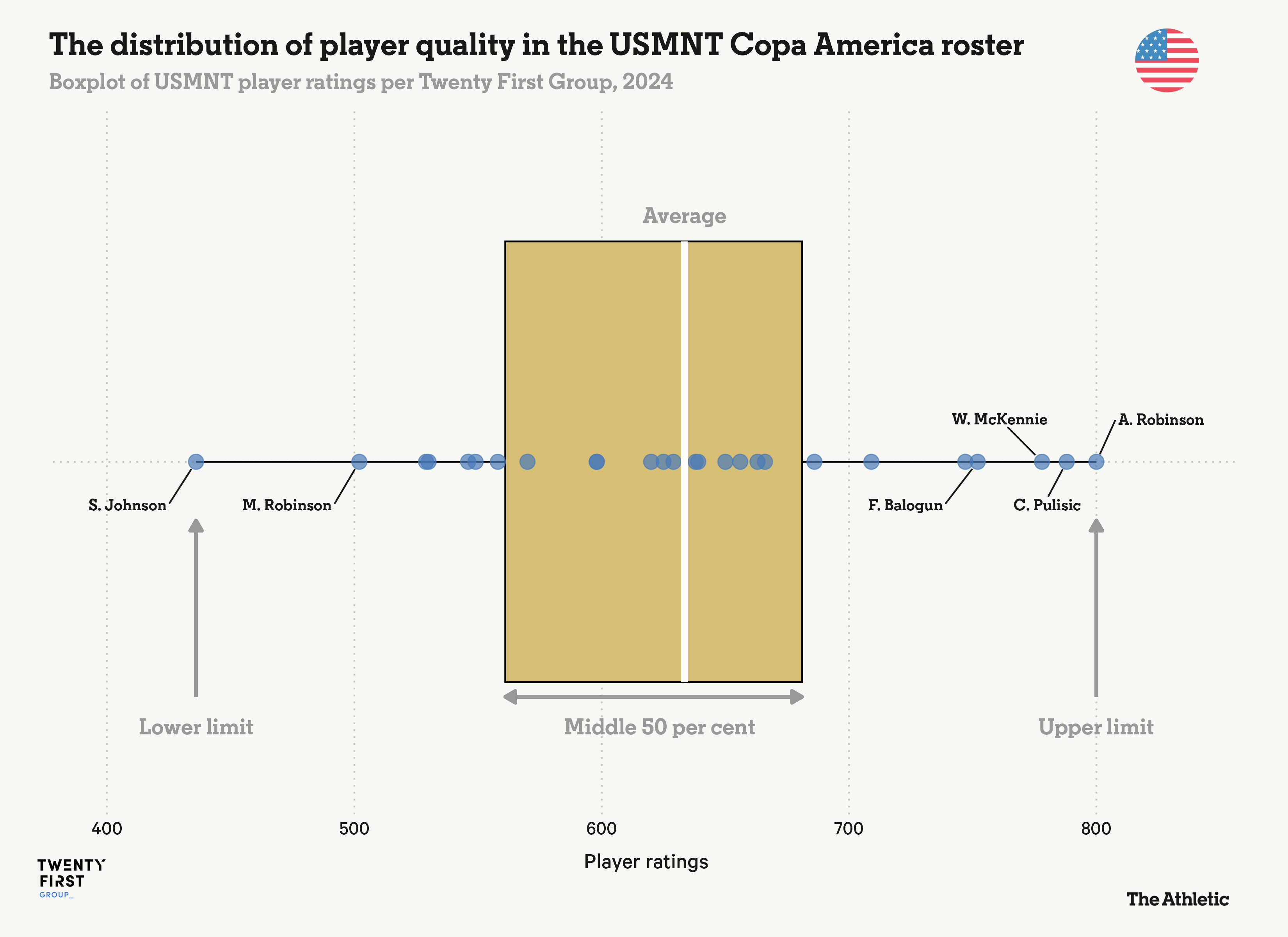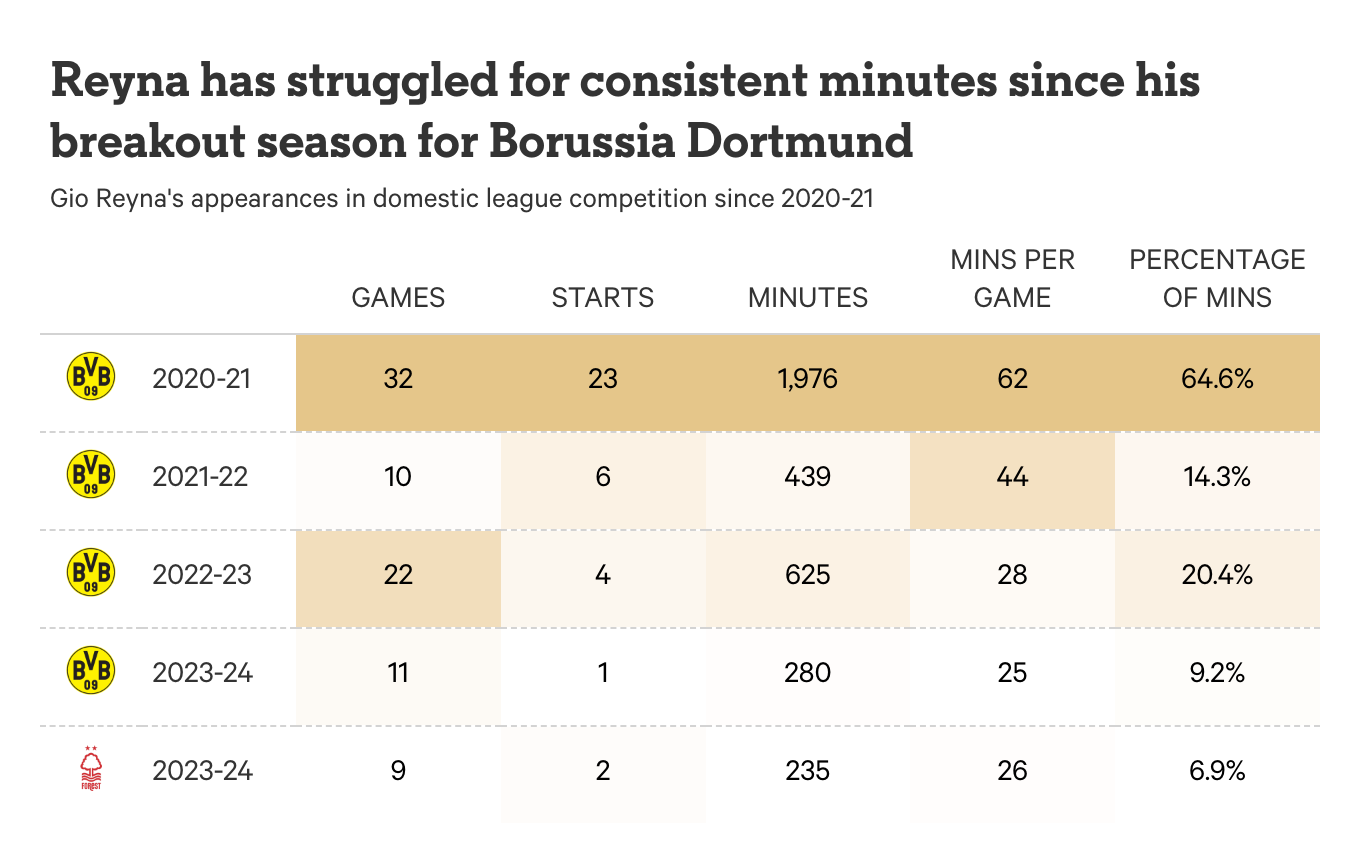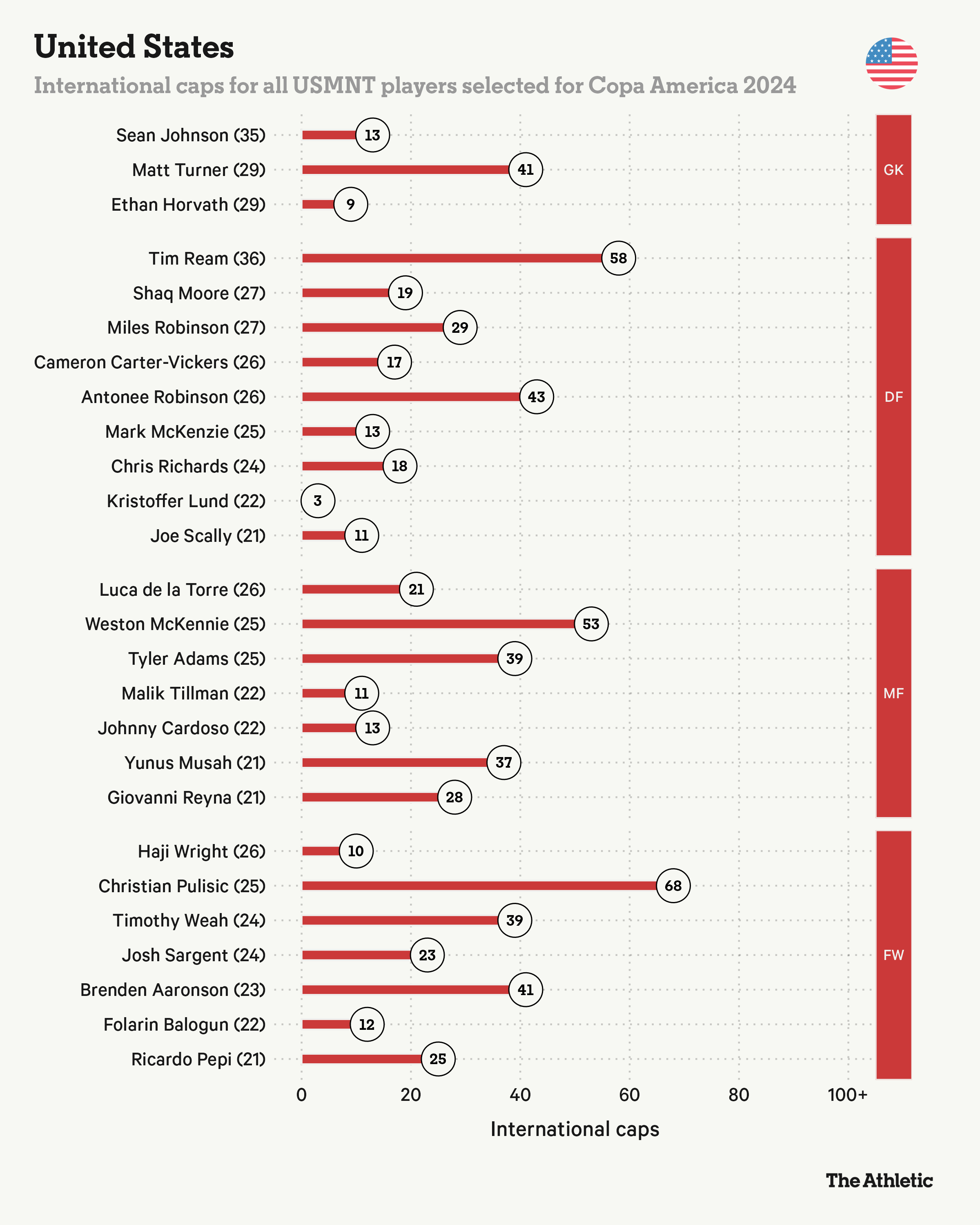In any era, the failure of the U.S. men’s national team to advance out of the group stage at a home Copa America would be disappointing. In the context of this particular set of players, it feels particularly egregious.
The discussion around the current U.S. team has centered on the idea it is better than any that came before it. That is a notion based largely on the fact more Americans are playing in Europe than ever before, and that those players are going to Europe earlier and playing for bigger clubs. In 2022, the USMNT played a World Cup finals game without a single MLS-based starter for the first time in that domestic competition’s history. Recently, its starting XI was made up of players from teams in Europe’s big five leagues (England’s Premier League, the German Bundesliga, La Liga in Spain, Italy’s Serie A and Ligue 1 in France — another first.
It is what has led to a “golden generation” label for this group, though whether it is deserved has been debated since before that World Cup coming up to two years ago. This Copa failure should reframe those discussions.
Yes, coaching will take on some of the blame for the disappointing results. Gregg Berhalter’s performance is being evaluated by the U.S. Soccer Federation with many fans, sections of the media and former players calling for him to be fired. But the players, too, failed to live up to expectations.
The results across both the 2022 World Cup, where the U.S. competed but ultimately fell in the 16-team first knockout round to the Netherlands, and now the 2024 Copa America as hosts, where their lone win came against Bolivia (84th in FIFA’s world rankings), have added further context to the debate. While the U.S. has a strong roster, its place in the global football landscape hasn’t shifted that much. It is 11th in the FIFA world rankings but the 14th-place overall finish in Qatar is probably about right.
Here, The Athletic digs into the data to explain where the USMNT really sits in terms of global soccer…
The U.S. Copa squad had 10 players at clubs ranked in the top 50 worldwide by data provider Opta.
Across the 40 nations competing in this Copa America and the European Championship happening in parallel in Germany, that ranked 15th, more than Serbia, Austria (both nine) and even Uruguay (eight), but behind Poland (11), Denmark (12), Switzerland (13) and Turkiye (16).
But while the U.S. has more players at top clubs, it appears to lack players who play vital roles for those same teams.
Insight from Twenty First Group — a sports intelligence firm which advises clubs, leagues and investors — allows us to drill a little deeper. Its player model generates ratings for more than 145,000 players worldwide, using factors such as the strength of a player’s team, their position, their playing time, and their contribution to the team’s attack or defense.
This data suggests that, on average, the U.S. has a strong group of players in comparison to the rest of Copa America, ranking fifth of the 16 nations for average player quality (indicated by the gold line).
Significantly, though, it also shows that the USMNT lacks players at the very top of Twenty First Group’s rating system, as shown by the extension of the black line after the maroon box. Seven different Copa America teams have players who ranked above Antonee Robinson, of Fulham in the Premier League, who is the highest-rated U.S. player per these rankings.
The issue is made even clearer when comparing Berhalter’s side to the eight teams who made the Euro 2024 quarterfinalists, where Robinson’s rating of 800 is beaten by 103 players from those nations.
While there is a tight concentration of high-quality players, the U.S. does not have as many difference-makers ranked at the top end of the model.
In Copa America, for example, game-changing talents such as Uruguay’s Darwin Nuñez, Luis Diaz of Colombia, Argentina’s star-laden front line and Brazil’s Vinicius Junior dwarf Robinson’s high score. But the list of higher-ranked players also includes Canadian pair Jonathan David and Alphonso Davies, Paraguay’s Gustavo Gomez and Piero Hincapié of Ecuador.
Of course, player quality is difficult to measure objectively, but even if you disagree with individual players on that list, the overarching conclusion of this model is clear.
The hopes around this American team have been built on exactly that: hope. The U.S. side that qualified for the most recent World Cup fielded 10 of the 11 youngest teams globally during qualifying, per U.S. Soccer. The USMNT starting XI during qualifying had an average of 23.82, almost two years younger than the next closest team — Ghana, 25.67.
Excitement around the potential of those young players built. Events at the World Cup may have even bolstered those expectations. The U.S. ranked eighth in field tilt, a metric which measures one team’s share of both sides’ touches in the attacking third; fourth in possessions reaching the final third, behind Germany, Brazil and Portugal; and fifth in successful counter-pressing rate. Statistically, the U.S. was better in Qatar than in its previous three World Cups.
But since then, progress has slowed — and maybe even stagnated.
The U.S. lost games in this cycle at Trinidad and Tobago and in the Gold Cup, with a ‘B’ squad, to Panama. They needed a late goal against Jamaica to escape with a win in the Nations League semifinal in March. They were beaten 3-1 by Germany in a friendly in October and 5-1 by Colombia ahead of Copa America. The group-stage losses to Panama and Uruguay were their fourth and fifth defeats in the past nine games.
There is a lack of progress, too, at club level.
Of this bright “golden generation,” it could be argued that just four players had significant roles at big clubs last season.
Robinson established himself as a top Premier League left-back at Fulham, Christian Pulisic is coming off a career year at AC Milan in Serie A with 15 goals and 10 assists across all competitions, Weston McKennie fought his way into the lineup at Juventus and started 29 games in Italy’s top division (although he appears on his way out of the club, potentially home to MLS), and Sergiño Dest started 25 games for a dominant, league-winning PSV Eindhoven team in the Netherlands before tearing an ACL in April and missing this tournament.
Gio Reyna, once considered the nation’s next big star after Pulisic, has played just 2,284 minutes across all competitions in the past three seasons combined, fewer than he played in his first full season at Germany’s Borussia Dortmund as a 17-year-old in 2020-21. That is due partly to injury but Reyna, now 21, is coming off of a year in which he struggled to get on the field at both Dortmund and Nottingham Forest, of the Premier League, where he was on loan from January.
Tyler Adams, 25, who once looked like he might develop into a regular starter for a Champions League challenger at RB Leipzig, was transferred to then Premier League Leeds United in 2022 and then played just three games at Bournemouth, in that same competition, last season due to injury.
Ricardo Pepi, 21, played a supersub role for PSV, starting just one game as they became Dutch champions. Tim Ream went from Fulham regular to a player who made just one appearance over the final three months of the season and now seems bound for a move to MLS. Goalkeeper Matt Turner played just 1,530 minutes at Forest, and none at all after February. Tim Weah (1,258 minutes at Juventus, mostly at right wing-back) and Yunus Musah (1,478 minutes for Milan) had only rotational roles at big clubs.
There is still hope for growth throughout the roster, of course, and your optimism around this group hinges on whether you think this pool is near its peak or still on the ascent.
Folarin Balogun, 23, had an up-and-down first season at Ligue 1’s Monaco in 2023-24, with seven goals and five assists, but is being counted on to produce at a big club. Chris Richards, 24, earned a starting role as a center back at Crystal Palace of the Premier League in February, and logged more than 2,000 minutes at a top-level club for the first time in his career. Malik Tillman started 17 games for PSV and ranked in the 90th percentile or better in eight different categories for his position in the Eredivisie, per fbref.com.
And while the USMNT is not the inexperienced, youthful group it was going into Qatar 2022, it was still the second-youngest team across Copa America and Euro 2024 with an average age of 25.2 years, only behind Costa Rica.
It is clear then that this team isn’t a golden generation, at least not in the way we think about teams given that label in the past (such as Luis Figo’s Portugal, Wayne Rooney’s England and Thierry Henry’s France). The U.S. just doesn’t have that top-end talent.
As they regroup from the setback of Copa America, the hope will be that American players can push forward at club level in Europe and try to raise their ceiling.
The 2026 World Cup, co-hosted with neighbors Canada and Mexico, is a massive opportunity. They can’t afford a repeat of this summer’s failure.
(Top photo: Nick Tre. Smith/Icon Sportswire via Getty Images)
Author :
Publish date : 2024-07-07 06:33:39
Copyright for syndicated content belongs to the linked Source.
Author : News-Sports
Publish date : 2024-07-07 10:33:39
Copyright for syndicated content belongs to the linked Source.



